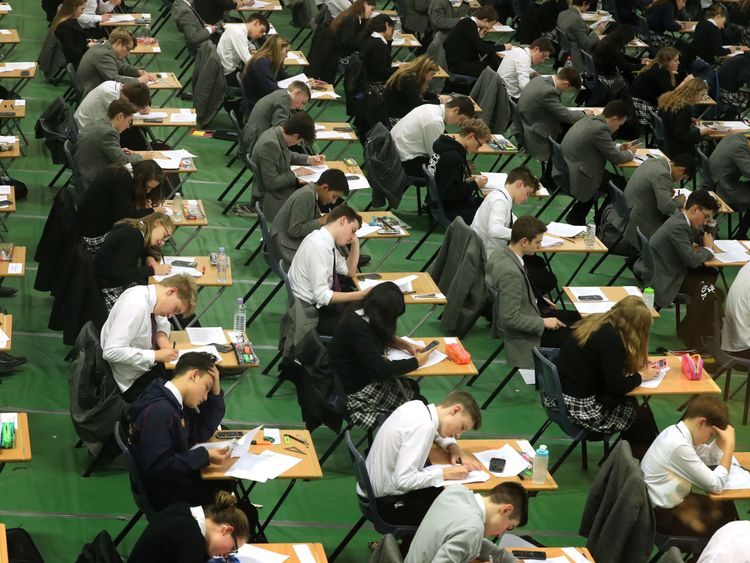Headteachers are warning that the new GCSE grading system sends a "demoralising message" to students who are likely to score lower results in their exams.
Teenagers who score lower than a 4 – equivalent to a C under the old system – in the new, tougher, GCSE courses, need to have their achievements recognised in a "better way", heads say.
Today 16-year-olds across England, Wales and Northern Ireland receive their GCSE results.
Those who sat their exams in England will have many of their tests marked under the 9-1 system, where 9 is the highest grade.
This replaces the A*-G grades and is the biggest shake-up of exams in England for a generation.
Subject exams under the 9-1 scheme have also been made tougher.
According to research by Cambridge Assessment, as few as 200 students could score a clean sweep of 9s in all of their GCSEs this year.
Last year, one in five (20%) UK GCSE entries scored at least an A – or a 7 under the new system, while two thirds (66.3%) scored at least C – equivalent to a 4 under the new system.
Ahead of results day, the Association of School and College Leaders (ASCL) said it had concerns about pupils performing at the lower end of the grading scale.
"The government's intention is that the new system provides greater differentiation between grades," Malcolm Trobe, ASCL general secretary said.
"For example, it replaces A* and A with three grades, 7, 8 and 9.
"Our concern, however, is over those pupils at the other end of the scale who are taking exams which are harder than their predecessors and who have been told by the government that a grade 4 is a 'standard pass' and a grade 5 is a 'strong pass'.
"That is a very demoralising message to those who achieve grades 1, 2 and 3, and the new system does not work very well for them at all.
"These young people have completed demanding programmes of study and we need to find a better way to credit their achievements."
It is expected that grade boundaries could be lower this year for new GCSEs compared with the old system to make up for lower scores.
Last year, when grades were awarded for the first time for new maths GCSE, students sitting the higher tier maths course needed to score at least 18% on average to secure a grade 4, while on average, 52% was needed for a 7, and 79% for a grade 9.

Exams regulator Ofqual has said it uses statistical processes to ensure that results are comparable year-on-year, and to ensure that students who are the first to take the new-style qualifications are not disadvantaged in any way.
Grades for new-style English and maths GCSEs were awarded for the first time last summer.
This year, 20 subjects will be awarded grades under the new system – with a 7 broadly equivalent to an A, and a 4 broadly equivalent to a C.
Meanwhile a poll found that more than two-thirds of teenagers are concerned about the new GCSE grading system.
Some 69% of the 1,000 14 to 17-year-olds questioned, who are currently waiting for their GCSE results, said they are generally concerned about the new grading system.
More from UK
The survey commissioned by the National Citizen Service also found 65% do not feel the new system will represent their grades as well as it should.
Just 4% of pupils polled expect to get mainly 9s – the highest grade.
[contf]
[contfnew]

Sky News
[contfnewc]
[contfnewc]







